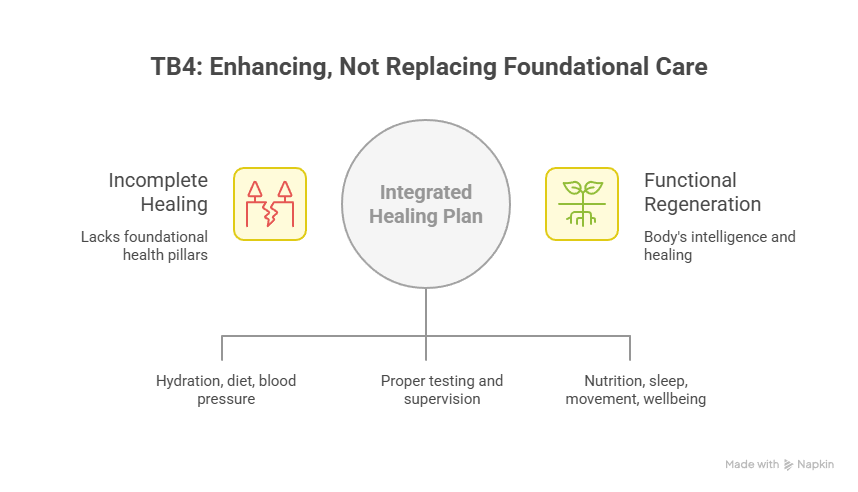.png)
Chronic kidney disease (CKD) affects millions worldwide, slowly eroding kidney function and quality of life. Traditional care often focuses on managing symptoms and slowing decline, yet many individuals are left asking, Is there a way to restore function, not just delay failure?
In today’s landscape of functional and regenerative medicine, hope is rising in the form of a naturally occurring peptide: Thymosin Beta-4 (TB4). While it might sound like a complex scientific term, this small protein plays a remarkably powerful role in healing, cellular protection, and tissue regeneration.
In this episode of Wellness Focused, Dr. Bismah Irfan, MD, a board-certified nephrologist and functional medicine expert, dives into the emerging potential of TB4 for individuals with kidney disease. Her approach reflects a shift from reaction to regeneration, empowering patients to understand how their body’s own healing intelligence can be supported and activated.
This blog will walk you through the role of Thymosin Beta-4, what makes it so promising in the context of kidney health, and how a personalized, functional strategy could transform how we view chronic kidney disease care.
What Is Thymosin Beta-4?
Thymosin Beta-4 is a naturally occurring peptide, a small protein made up of a string of amino acids, found in virtually every tissue of the human body. It's produced by cells in response to injury, inflammation, and stress. Think of TB4 as your body’s “first responder”, rushing in to manage damage, modulate inflammation, and stimulate repair.
Some of the remarkable actions of TB4 include:
- Reducing pro-inflammatory cytokines
- Encouraging new blood vessel growth (angiogenesis)
- Protecting cells from oxidative stress
- Promoting tissue remodeling and healing
- Supporting immune system balance
These effects are not limited to one organ, they’ve been observed in muscle, heart, brain, liver, and now, most excitingly, kidneys.
In Dr. Irfan’s functional practice, peptides like TB4 are seen not as miracle cures, but as tools, powerful, biologically intelligent tools, that can support the body’s natural healing when used appropriately and in the right context.
Why Kidney Health Needs a Regenerative Approach
Traditional nephrology often focuses on delaying the inevitable. While blood pressure control, glucose regulation, and minimizing protein loss are critical foundations of care, they don’t directly reverse damage already done to kidney tissues.
But kidneys are more resilient than we often give them credit for.
Kidney tissue doesn’t regenerate like skin or liver cells, but that doesn’t mean it’s entirely incapable of repair. Specialized cells within the kidney, such as podocytes (which filter blood) and tubular epithelial cells (which reabsorb nutrients and water), can adapt, recover, and even regenerate under the right conditions.
What they need is a supportive environment, free of excessive inflammation, oxidative stress, and fibrosis. That’s where TB4 shines.
TB4’s Key Benefits for Kidney Health
1. Anti-Inflammatory Powerhouse
Chronic kidney disease is characterized by low-grade, persistent inflammation. This silent fire damages the glomeruli, blood vessels, and tubules within the kidney, creating a cascade of tissue breakdown.
Thymosin Beta-4 has been shown to significantly downregulate inflammatory mediators, including TNF-alpha, IL-1β, and NF-κB. By calming the inflammatory storm, TB4 creates a safer, more stable internal environment where healing is possible.
From Dr. Irfan’s functional lens, reducing inflammation is not just about suppressing symptoms, it’s about removing obstacles that prevent the body from doing what it does best: regenerate.
2. Fibrosis Reduction
Fibrosis is the scar tissue that forms when kidneys are repeatedly injured or inflamed. It’s what replaces functioning nephrons (filtering units) with stiff, non-functional tissue, leading to progressive decline.
TB4 has demonstrated anti-fibrotic properties, meaning it can interrupt the scarring process. It helps regulate fibroblast activity, the very cells responsible for laying down fibrotic tissue, and supports healthy remodeling of damaged areas.
For patients in the early-to-mid stages of CKD, this opens up an exciting possibility: instead of watching scarring worsen year by year, we can begin to interrupt and possibly reverse this damage.
3. Podocyte Protection
Podocytes are the frontline warriors of your kidney’s filtration system. These specialized cells prevent protein from leaking into the urine and maintain the integrity of the glomerular barrier.
Once damaged, podocytes do not easily regenerate, and their loss is a critical turning point in kidney disease progression.
Research has shown that TB4 may help protect podocytes from oxidative stress and apoptosis (cell death). In animal models, TB4 reduced proteinuria (protein in urine), preserved glomerular structure, and enhanced podocyte survival.
This is one of the most exciting findings in TB4 research because it speaks directly to the preservation of kidney function, not just slowing its decline.
4. Angiogenesis and Blood Flow Enhancement
Healthy kidneys rely on strong microvascular networks to deliver oxygen and nutrients. Unfortunately, CKD often involves microvascular rarefaction, a loss of these tiny blood vessels, which further starves the tissue and accelerates degeneration.
TB4 supports angiogenesis, or the formation of new blood vessels, especially in areas of injury or hypoxia (low oxygen). By restoring microcirculation, TB4 helps oxygenate and nourish damaged kidney tissues.
This action is particularly meaningful in patients with ischemic kidney disease or diabetic nephropathy, where blood flow impairment plays a central role.
Realistic Hope, Not False Promises
Dr. Irfan is careful to point out that TB4 is not a magic bullet. It is not a replacement for foundational care like proper hydration, blood pressure control, metabolic management, or dietary interventions.
Instead, TB4 represents what’s possible when we shift from disease management to functional regeneration.
Used in the right context, with proper testing, supervision, and integration into a broader healing plan, TB4 can be a valuable ally. It reflects the body’s own intelligence and healing potential.
But no peptide, supplement, or therapy can substitute for the basics: anti-inflammatory nutrition, restful sleep, daily movement, emotional wellbeing, and spiritual connection. These pillars create the environment in which therapies like TB4 can truly work.

A Functional, Personalized Approach Is Essential
Peptide therapy, including Thymosin Beta-4, is still an evolving field. It should be approached with care, intentionality, and professional guidance.
Dr. Irfan emphasizes the following key considerations when exploring TB4:
1. Comprehensive Testing
Before considering TB4, it’s crucial to understand the full picture of kidney function and systemic health. This includes:
- eGFR and creatinine levels
- Proteinuria (albumin/creatinine ratio)
- Inflammatory markers (CRP, IL-6)
- Oxidative stress markers
- Hormonal status
- Nutritional deficiencies
- Immune health
Testing helps identify not just the level of kidney dysfunction, but why it’s happening, and how to reverse it.
2. Root Cause Identification
Rather than chasing symptoms, Dr. Irfan seeks to answer deeper questions: Is there insulin resistance driving inflammation? Is the patient exposed to environmental toxins? Are chronic infections at play?
Peptide therapy like TB4 is most effective when layered on top of a root-cause strategy, not used as a standalone fix.
3. Safe Administration and Dosing
TB4 is typically administered via subcutaneous injection and requires careful dosing protocols. Working with a practitioner trained in peptide medicine ensures:
- Correct dosage and frequency
- Monitoring for side effects or interactions
- Periodic assessment of therapeutic impact
This is especially important for patients with advanced kidney disease or comorbid conditions.
A Story of Hope: One Patient’s Journey
Dr. Irfan recalls a 47-year-old woman with early-stage CKD, autoimmune thyroid disease, and fatigue that limited her daily function. Despite normal labs by conventional standards, deeper functional testing revealed inflammation, low glutathione levels, and early podocyte injury.
After optimizing diet, correcting micronutrient imbalances, and implementing gentle detoxification, Dr. Irfan introduced a short cycle of Thymosin Beta-4 under close supervision.
Within months, the patient reported improved energy, normalized proteinuria, and stabilized kidney markers. Perhaps even more powerful was her emotional transformation, from fear to confidence in her body’s healing ability.
Final Thoughts: Healing Is Possible
The journey through kidney disease is often filled with fear, frustration, and uncertainty. But it doesn’t have to be defined by limitations.
Thymosin Beta-4 reminds us that the body is capable of healing when given the right tools and environment. Whether you’re newly diagnosed with CKD, struggling with fatigue, or seeking to protect your kidney health for the long term, you have options.
Functional medicine empowers you to move beyond the passive patient role and become the active author of your health story.
Peptides like TB4 are not a miracle, they are a mirror, reflecting the regenerative brilliance that’s already within you.
If you’re curious about whether Thymosin Beta-4 could support your kidney health, reach out to Dr. Bismah Irfan’s team to explore a personalized, functional plan. Because your healing is not only possible, it’s already underway.
Special Offer: Take $50 off your first visit and discover how personalized, root-cause medicine can transform your health.
